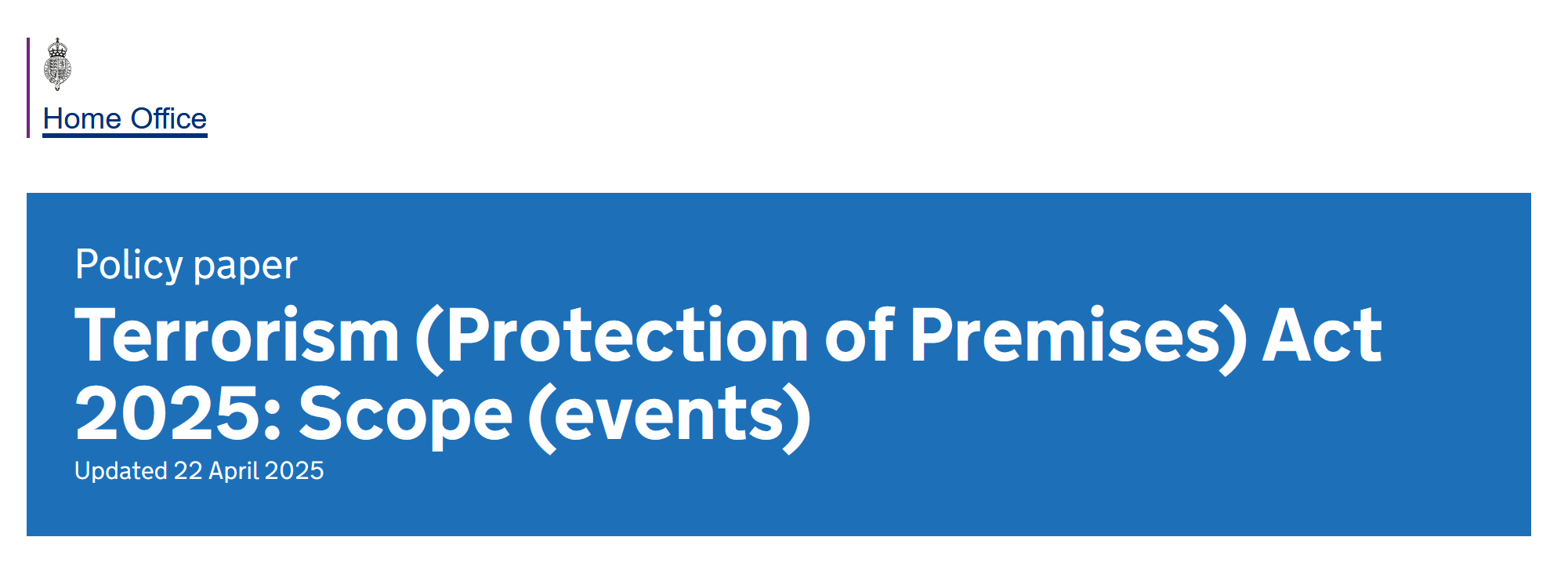
Martyn’s Law: Prepare Your Venue for the Terrorism (Protection of Premises) Act 2025

The Terrorism (Protection of Premises) Act 2025 - widely known as Martyn’s Law - received Royal Assent on 3 April 2025.
It introduces new legal duties for organisations responsible for public venues and events where 200 or more individuals may be expected (standard duty) and 800 or more (enhanced duty).
The aim is simple but vital: to make sure every premises can detect, deter and respond to potential threats in a proportionate and practical way.
At imabi, we simplify this process: transforming complex legislative change into clear, digital tools that help you strengthen safety, demonstrate compliance, and build public confidence.
View the official Terrorism (Protection of Premises) Act 2025 on legislation.gov.uk

Why Martyn’s Law Matters for Venues and Events
Martyn’s Law is one of the most significant changes to public-venue safety in years. It turns voluntary good practice into a legal duty to take steps, so far as is reasonably practicable, to reduce vulnerability to terrorism and protect people if an incident occurs.
For many organisations, that means new expectations around planning, staff awareness and incident response. Unclear roles, inconsistent procedures and fragmented reporting make it hard to act quickly, and harder to evidence compliance when asked.
Standard duty emphasises simple public-protection procedures and staff preparedness; enhanced duty adds proportionate measures to reduce vulnerability.
There is an implementation period (at least 24 months) before full enforcement, but starting now avoids later risk, cost and disruption and aligns with guidance from the Home Office, ProtectUK and the forthcoming regulator, the SIA.
At imabi, we bridge the gap: one connected place for your procedures, reporting and staff guidance - making preparedness practical, proportionate and auditable.

Who Martyn’s Law Applies To
The Terrorism (Protection of Premises) Act 2025 applies to publicly accessible premises and events across the UK.
If your venue or activity allows members of the public to enter (whether ticketed or free, indoors or outdoor) you may fall within its scope.
Standard Duty Premises and Events
The standard duty applies where it is reasonable to expect 200 or more individuals may be present at any one time.
Duty-holders must prepare and maintain basic public-protection procedures, ensure staff awareness training, and be able to show that reasonable steps have been taken to reduce risk and vulnerability.
Typical examples include:
Theatres and concert venues
Sports grounds and community stadia
Museums, galleries and visitor attractions
Nightclubs, cinemas and large bars
Festival and event sites
Shopping centres and malls
Hotels and conference venues
Enhanced Duty Premises and Events
The enhanced duty applies where it is reasonable to expect 800 or more individuals may be present.
These organisations must take further, proportionate steps to reduce vulnerability, develop robust incident plans, and notify the regulator, the Security Industry Authority (SIA), of their designated responsible person.
Enhanced-duty examples include:
Arenas and large stadiums
Major theme parks and amusement destinations
Convention and exhibition centres
Transport hubs and large public spaces
High-footfall retail complexes
How to Determine If You’re in Scope
The Act uses the concept of “individuals expected to be present” rather than licensed capacity.
Your tier is based on the reasonable number of people likely to attend during normal operations or at peak times.
You can read the official guidance here:

What’s Required Under Martyn’s Law
The Terrorism (Protection of Premises) Act 2025 introduces new, proportionate public protection requirements for venues and events that meet the thresholds defined in law.
These duties depend on the number of individuals expected to be present and are designed to make venues safer so far as is reasonably practicable - without imposing unnecessary burdens.
While detailed guidance will follow during the implementation period, the Home Office has confirmed two distinct tiers of responsibility: Standard Duty and Enhanced Duty.
Proportionate, Not Prescriptive
The Home Office and ProtectUK have both emphasised that Martyn’s Law is not a one-size-fits-all framework.
It is about embedding proportionate preparedness and taking steps that are suitable for your environment, staff, and operations.
The Act recognises that the needs of a small theatre differ from those of a major stadium, but the shared goal remains the same: to reduce vulnerability and protect the public.
Standard Duty - 200 or More Individuals Expected
The Standard Duty applies to venues and events where it is reasonable to expect 200 or more individuals at one time.
It focuses on awareness, simple procedures, and preparedness: ensuring staff understand how to act and protect the public if an incident occurs.
Organisations in this tier must:
Develop and maintain basic public protection procedures, covering actions such as evacuation, lockdown, and communication.
Provide staff awareness training on recognising and responding to terrorist threats.
Keep a simple record showing that procedures exist and have been communicated to relevant staff.
These measures can be integrated into existing health and safety or emergency procedures and should reflect what is reasonably practicable for the size and nature of the venue.
Read more: Home Office Factsheet – Standard Duty Requirements (GOV.UK)
Enhanced Duty - 800 or More Individuals Expected
The Enhanced Duty applies to premises and events where 800 or more individuals may be expected to be present.
In addition to the Standard Duty steps, organisations must take proportionate actions to reduce vulnerability and formalise their response arrangements.
Enhanced duty-holders will be required to:
Conduct and maintain a risk assessment identifying vulnerabilities to acts of terrorism.
Implement proportionate security measures to reduce those vulnerabilities.
Prepare and maintain a written security plan setting out how risks are managed.
Designate a Responsible Person to oversee compliance.
Notify the regulator (the Security Industry Authority, SIA) and cooperate with inspections or requests for evidence.
Read more: Home Office Factsheet – Enhanced Duty Requirements (GOV.UK)
Implementation Period
Following Royal Assent in April 2025, there will be an implementation period of at least 24 months before enforcement begins.
This time is intended for venues and event operators to understand their new obligations, review their existing safety measures, and plan proportionate improvements ahead of regulatory oversight by the SIA.
Read more: Home Office Factsheet – Regulator, Sanctions and Enforcement (GOV.UK)
Moving towards Compliance
The Terrorism (Protection of Premises) Act 2025 is now law, marking the start of a new era in public venue safety and preparedness.
While full enforcement will follow an implementation period, the direction of travel is clear: every organisation responsible for publicly accessible premises must be ready to detect, deter, and respond to potential threats - in ways that are practical and proportionate.
Last updated: 28 October 2025
Preparing for Martyn’s Law isn’t about creating new bureaucracy or adding unnecessary complexity. It’s about embedding a culture of awareness, communication, and shared responsibility.
By understanding your tier, reviewing existing safety measures, and developing clear procedures now, you can move beyond basic compliance to genuine confidence: protecting both people and reputation.
To explore how the law will apply to your organisation and what proportionate steps you can take during the implementation period, visit the official resources below.

The Terrorism (Protection of Premises) Act 2025 is entering its implementation period.
Organisations that start preparing now will save time, reduce cost, and demonstrate proactive responsibility for public safety.
To see how imabi’s Pro and Connect platforms can support your readiness plans, click here






